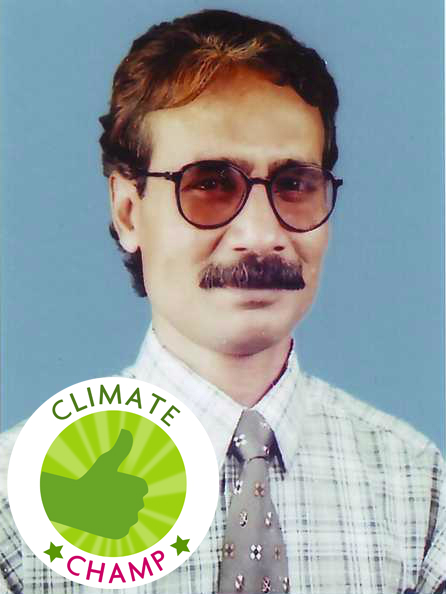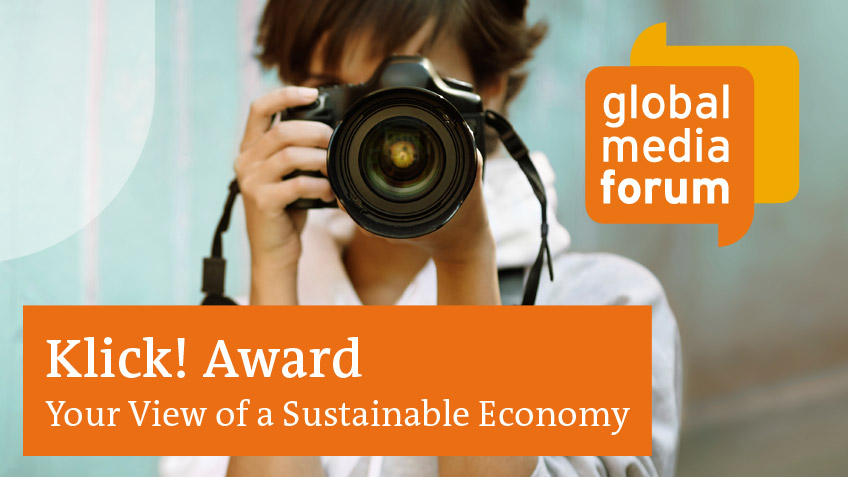Search Results for Tag: environment
Climate champ – ‘we must stop being a slave to consumption’
 Do you feel responsible for our future? Are you tired of waiting for a breakthrough at climate conferences? If you are already taking action yourself, you are our ClimateChamp and we want to get to know you! Answer our questionnaire to become a part of our new blog series, take your chance to be nominated as a Climate Champ.
Do you feel responsible for our future? Are you tired of waiting for a breakthrough at climate conferences? If you are already taking action yourself, you are our ClimateChamp and we want to get to know you! Answer our questionnaire to become a part of our new blog series, take your chance to be nominated as a Climate Champ.
What is your name? How old are you? And where do you live?
My name is SM Farid Uddin Akhter Farid. I was born on January 1, 1964 in Bangladesh.
How does climate change affect your everyday life / your community?
Nature’s behaviour has been regularly irregular and erratic. The basic securities of food, water, energy, livelihood and human life are highly threatened. And my country, Bangladesh, has been identified as the most vulnerable by scientists and policy makers across the world.
What trigger event led you to start fighting climate change?
No special event. Just the considered opinion that if we want peace for all, if we want to ensure rights for all, everybody has to save a bit, reserve, preserve, rejuvenate and conserve resources. Therefore we need a significant change in mindset, behaviour and attitude if we want to combat climate crisis, reduce risk and poverty and save biodiversity.
How exactly do you fight climate change?
I’m part of the Sasrai movement. The movement is aimed at spurring each individual, family, community, institution and organization to combat climate change and global warming and think about issues such as food, fuel, water security, poverty, disaster, waste, ecosystems and biodiversity etc.. Even small changes in our daily behaviour can help prevent greenhouse gas emissions without affecting our quality of life. In fact, they can also help save money. The Sasrai-movement policy commits to save resources and to reduce solid waste in our daily living – no matter how small it is.
What do you say to climate change deniers?
The world is heading for irreversible and potential catastrophic climate change. Just think about the repeated natural disasters in Australia, Africa, New Zealand, Brazil, Pakistan, Japan, Iran, Myanmar, Thailand, USA, Russia and Indonesia. Remember what superstorm Sandy did to the Caribbean and North America? Nature rebelled! It didn’t discriminate between a rich super power or a poor nation. So each one of us must ask ourselves “how could I be consuming less?” We must stop being a slave to consumption.
Worst case scenario: What do you think your city will look like 10 years from now, if no action is taken to fight climate change?
There will be excessive heat and cold in the cities, lack of safe water and water logging due to sudden excessive downpours, especially in the region I live. But the Sasrai movement’s main consideration is tomorrow, the future generation who are not responsible for destroying the earth’s resources. We believe in the potential of communities to solve their own problems and adapt to climate changes with the help of resources they own right now.
Best case scenario: What do you think your city will look like 10 years from now if more and more action is taken to fight climate change?
Hopefully, there will be no more lack of soft water, no more land slides, less suffering among low income people and no more flooding in parts of my city.
Short and simple: What do you demand from your government as far as climate change is concerned?
To raise mass awareness, to wish peace for all and to ensure rights for all. Everybody must save a bit, reserve, preserve, rejuvenate and conserve resources. It would be great if they had a hand-written Sasrai movement poster in every government building.
How can interested people get involved in your project?
Since 2004, we have been trying to bring about a significant change in mindsets, behaviour and attitudes among all regarding use and abuse of resources. We promote austerity aimed at curbing hunger, poverty, water scarcity and environmental degradation. We are in the process of strengthening programs in educational institutions aimed at bringing significant behavioural and attitudinal change among children.
Sustainable Economy in focus of this year’s DW photo competition KLICK!

From 17-19 June, this year’s Deutsche Welle Global Media Forum in Bonn will spotlight “The Future of Growth – Economic Values and the Media”. A worldwide photo competition will honour outstanding images that capture related themes.
This year’s photo competition KLICK! is called “Your view of a Sustainable Economy”. The deadline for submissions is April 10. Online voting begins on April 17. Of the ten finalists chosen by the online voting, three winners will be selected by the participants of this year’s Deutsche Welle Global Media Forum. First prize is an iPod Nano (8 GB). The runner-up will receive an iPod-Shuffle (2 GB), and the third prize is a USB flash drive.
Entries can be uploaded to the website http://www.dw-gmf.de/klick or submitted by email to klick@dw.de. Deutsche Welle will publish the entries online as part of a gallery and an interactive map at http://www.dw-gmf.de/klick.
The equatorial water flow mystery
The sink water spin mystery from DW_Global Ideas on Vimeo.
Our reporter Joanna was very surprised when she found out which way water drains away when she was filming at the Equatorial Line in Uganda. Can you guess what happened?
![]() read more
read more
Climate Change – Back at Business
This year’s edition of the World Economic Forum (WEF) is up and running at the Swiss mountain resort Davos. It’s the place to be, if you have anything to do with finance and business today. Everyone has descended on Davos, from high level media people to the top notch of the business elite. And there’s no shortage of topics on the agenda this year – the lack of global growth, the euro crisis, of course, and what’s happening in the Middle East. Nothing new here.
But surprisingly there IS something new and unexpected on the delegates’ plates, and it’s called climate change. It’s about time, isn’t it? As if to make a point, a collection of reports that call for prompt and substantial action on climate change, development and sustainability is quite impressive, writes the executive director of the Stockholm Environment Institute, Johann L. Kuylenstierna at RTCC, the official observer to the United Nations climate change negotiations.
There certainly have been a lot of eye-opening climate events over the last year that have grabbed the headlines and left plenty of people baffled. Like the highly debated “pause” in the rise of global temperatures, the inconceivable return of Arctic sea ice or temperatures in Australia that were so high that the Bureau of Meteorologists had to add an extra color to its heat scale.
Two days ago, UN Secretary General Ban Ki-moon called climate change a top priority issue alongside with Syria. That may help the 2,500 people in Davos focus on the climate.
There are quite a few papers and reports that take a look at climate change and it’s implications. The Green Growth Action Alliance led by former Mexican President Felipe Calderón quotes figures that are a stiff wake-up call: some $14 trillion will be needed, say researchers, to be spent on low-carbon industry and infrastructure until 2030. That translates to an investment of $700 billion a year! Calderón’s message is clear: there is no time to waste.
And there’s more: The Global Risks Report 2013 says that stresses on economic and environmental systems are on a “collision course” that could pose “unprecedented challenges” to global and national resilience. Others build cases for addressing climate issues in supply chains and as a strategic response to consumer demands.
None of this is exactly new. But the sheer number of notes or speeches lately could give the climate some momentum in Davos and beyond. Even the fact that US president Barack Obama declared it necessary for the United States to respond to climate change may have been an important sign in itself.
An awkward position
Klaus Esterluss and Kerstin Schnatz, Doha
They all had to squeeze through: Shoppers and staff from surrounding restaurants moved past a tree made out of cans and tires at Doha’s traditional market area yesterday. 16 year old Mourad Farahat from Egypt and his friends from the organisation „You Think Green“ tried to raise the awareness of passers by for a greener future. Despite having received a permission for setting up their action at a spacious juncture a few meters further down, security guards told them to move the symbolic tree to a very inconvenient area with hardly any space, between a wall and the outside seating area of a restaurant.
Planting a tree at Doha’s Souq Waqif from DW_Global Ideas on Vimeo.
Critical juncture
By being in this awkward position of Doha’s „Souq Waqif“, the youths shared a fate with the international climate negotiations taking place in the same city that day. Civil society groups watching the international process carefully, are heavily critizising the Qatari Presidency for not showing enough leadership. „Key elements are stalling“ Wael Hmaidan, director of Climate Action Network, said. According to Hmaidan, the talks that are scheduled to end on Friday, December 7th, were at „a critical juncture“. The NGO expert is in line with young Mourad, when asking for a global reduction of carbon emissions and more money to help poorer countries adapting to climate change.










Feedback